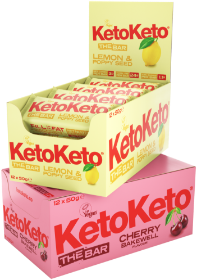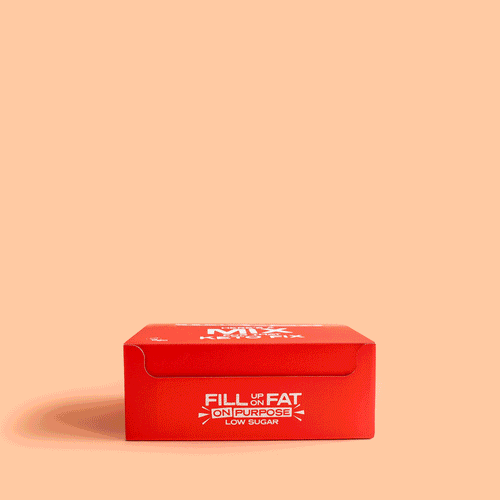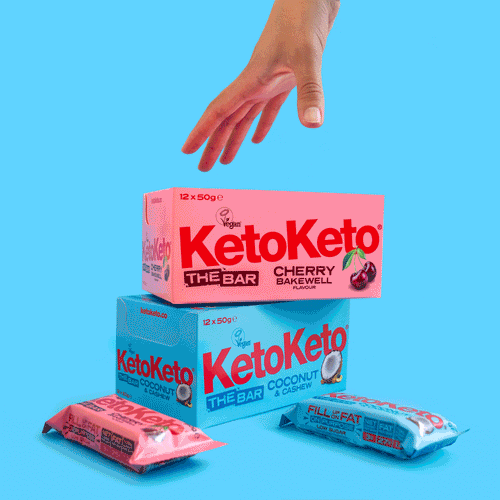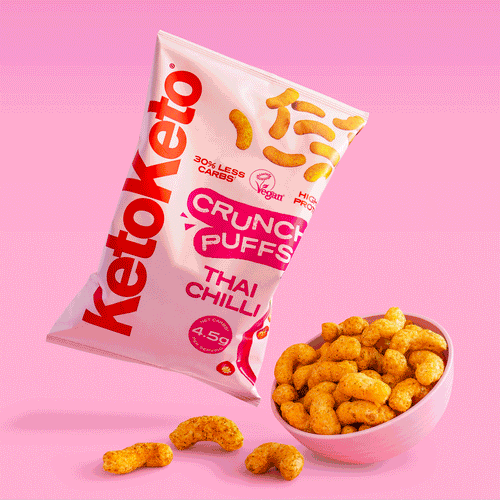There’s a lot to learn when you’re new to Keto. From basic information about what to eat and how much, to fasting, supplements and net carbs. The world of Keto can seem daunting and confusing to a beginner.
Yet with the Keto diet growing in popularity due to its impact on weight loss, energy and improvement to overall health, more and more people want to quickly find out what Keto involves.
If that’s you, you’ve found the right place. We have here a short beginners guide to Keto to let you know what to eat, how much, mistakes to avoid, the low-down on fasting, supplements, and understanding net carbs. Everything you need to know to understand the Keto diet and lifestyle - you’re welcome!
The Basics
Keto, short for the Ketogenic diet, is all about the good fats and healthy proteins, you’ll need to be eating 80% and 15-20% respectively. Carbohydrates are mostly removed from your diet altogether, except for a tiny amount of nutritious high-fibre carbs.
What’s the reason for this? It’s all about how your body uses energy. When you remove most carbohydrates from your diet, your body has to fuel itself differently. Instead of making glucose from carbs, your body will produce ketones from fat. This puts your body in a state known as Ketosis, hence the name Keto.
Healthy fats in the form of meat, fish, eggs, nuts and oils are vital for regeneration and repair. Proteins play a critical role in building tissues and maintaining balance. Eating a Keto diet has been shown to aid weight loss, and improve overall health.
What’s All This Talk About Macros And Net Carbs?
‘Macros’ is the shortened name for macronutrients. Macronutrients are the three main food groups we eat to fuel our bodies - fat, protein and carbohydrates. It really is that simple!
Why does the Keto diet involve so much chat about macros? Well, it’s all to do with the proportion of macros and ensuring you consume the right amount of each for your body to keep you in Ketosis. If you eat too much of one of the macros, you may not be in Ketosis and the whole point of eating Keto kinda goes out the window. That’s why we keep talking about them!
Working out your personal requirement of macros depends on your gender, height, weight and level of activity. There are many online tools that can help you work them out for yourself. Or for a more detailed overview of how to work them out, and why they’re important, take a look at our previous article, ‘What Are Macros And How Do I Calculate Them?’.
Net carbs are part of working out your macros. Net carbs basically means carbohydrates without the fibre. Carbohydrates are made up of sugars and fibre, some of which isn’t digested by your body into glucose. Some on the Keto plan therefore choose to calculate only the amount of carbs their body will digest - net carbs, total carbs minus the fibre.
So What Will I Be Eating?
Mostly fat! On Keto, you should be aiming to eat around 80% fat. But the quality of the fats you eat really matter.
Healthy fats such as medium-chain triglycerides and Omega-3 fatty acids, support your body with essential nutrients for nerve, muscle and immune health. Good levels of healthy fats can also improve blood cholesterol levels and reduce inflammation.
Fats are also vital for the absorption of other important nutrients such as Vitamin A, D, E and K. When you eat a high percentage of healthy fats, you’ll also feel fuller for longer, minimising your need to snack on unhealthy options to see you through to dinner.
What kinds of healthy fats will you be eating? Fish like salmon and tuna, olives, avocados, coconut oil, nuts and seeds are all great options for healthy fats.
The next largest proportion of food you’ll eat on Keto is protein. You ought to be aiming for between 15-20% of your calories from protein.
Proteins are made up of amino acids - the building blocks of all the tissues in your body. So it’s really important you eat a decent amount of protein. Without sufficient levels of protein in your diet, your tissues cannot grow and regenerate.
Protein-rich foods also help you feel full for longer. Some great Keto-friendly sources of protein include: meat, poultry, fish, eggs, cheese, and tofu.
Lastly, you’ll eat a very small amount of carbohydrates, less than 5% of your calories which works out to be a really small amount. Many fruits and vegetables are high in carbs, as well as grains and pulses so this will be the most difficult change when moving to a Keto diet.
The type of carbs you’ll likely include in your Keto diet will be berries. Berries are one of the low carb fruits you can enjoy on Keto.
Why Is Fasting So Popular With Keto?
Fasting tends to go hand-in-hand with a Ketogenic diet because it can quickly put your body into a state of ketosis. Without calories, your body will start to burn fat for energy. Many Keto-ers opt to regularly fast as part of their Keto lifestyle to help them reach their weight-loss goals faster, or to enhance the benefits of living in Ketosis.
There are different ways to fast; some choose 6 days of eating, one day of fasting, others choose to fast at night, or to stop eating at a certain time every evening and have a late breakfast every morning. It’s important to choose an option that works for you and your commitments.
For more on the how tos of fasting, check out our previous piece, ‘Fasting On A Ketogenic Diet And The Best Ways To Break It’.

Save more when you combo up!
Save more when you combo up with all your favourite flavours of KetoKeto. Our two best selling flavours are Cherry Bakewell and Coconut Cashew. Have you tried them yet?
Should I Be Using Vitamins and Supplements On Keto?
If you want to give yourself the best chance of success with Keto and to feel as good as you possibly can, it’s a good idea to use supplements and vitamins. Many people who adjust to living on a Keto diet suffer with flu-like symptoms to begin with, dubbed the ‘Keto Flu’. It mimics the flu with headaches, aches, pains, fatigue and general feelings of being unwell. These symptoms are common as your body adjusts to using fat rather than sugar for fuel.
However, you can relieve the worst of the symptoms by supporting your body with vital vitamins and nutrients. Electrolytes and Digestive Enzymes can help your digestive system cope with the change in macro portions, while Magnesium and MCT Oil can provide your body with everything it needs to feel great. For more on the best vitamins and supplements while on Keto, take a look at, ‘The 6 Best Vitamins and Supplements On Keto.’
What Easy Mistakes Should I Be Aware Of?
When you’re new to something, it’s easy to make beginner mistakes. So what are the likely pitfalls to avoid when you begin Keto?
Going All In
It’s great to be motivated, but take your time switching from your usual diet to Keto. If you go from eating lots of carbs one day to almost none the next, you’re going to shock your body, and make it much harder for yourself. Instead, reduce the amount of carbs you eat each day over a longer period. Get your supplements, and find out some delicious meal and keto snack ideas so you have all you need to enjoy the change.
The Wrong Fats
You may be over the moon about eating more fat, but it’s not all ice cream and bacon. Going Keto is about quality nutrition and being healthy. By all means enjoy some bacon for breakfast! But make sure the majority of your fat intake is the good kind - Omega 3s and medium-chain triglycerides to keep you fit and well.
The Wrong Fruit and Veg
Lots of fruit and veg are high in carbohydrates. Starchy veg like potatoes, carrots, parsnips and squash are high in carbs. Most fruits are too. That doesn’t mean you should avoid fruit and veg though, as you’ll need plenty of fibre to keep your digestive system happy. Rather, learn about the best fruit and veg to eat on Keto.
Too Much Protein
It’s easy to go meat-heavy on Keto, but if you rely mostly on meat to get your fat intake, you may eat too much protein. Excess protein in your body will be converted into glucose. This could prevent your body moving into Ketosis, so make sure your fat intake comes from mostly pure fat sources like MCT Oil, Ghee and nut butters.
Not Enough Water
It’s important you drink enough fluids! Hydration is key to good metabolism and fat break-down. Without sufficient amounts of fluids, your body will slow metabolism and have difficulty digesting the food you’re eating, and you’re more likely to feel unwell. Don’t just focus on what you’re eating, make sure you’re drinking plenty too.
Keto Like A Pro
We hope you feel wiser about what Keto involves and how to start as a newbie. The jargon is simple to understand once you know what it’s referring to, and there are lots of online resources to help you get started.
Take your time, discover new types of food, supplement, drink plenty and remember it’s about taking better care of yourself. Then, enjoy the better you that comes from going Keto!






